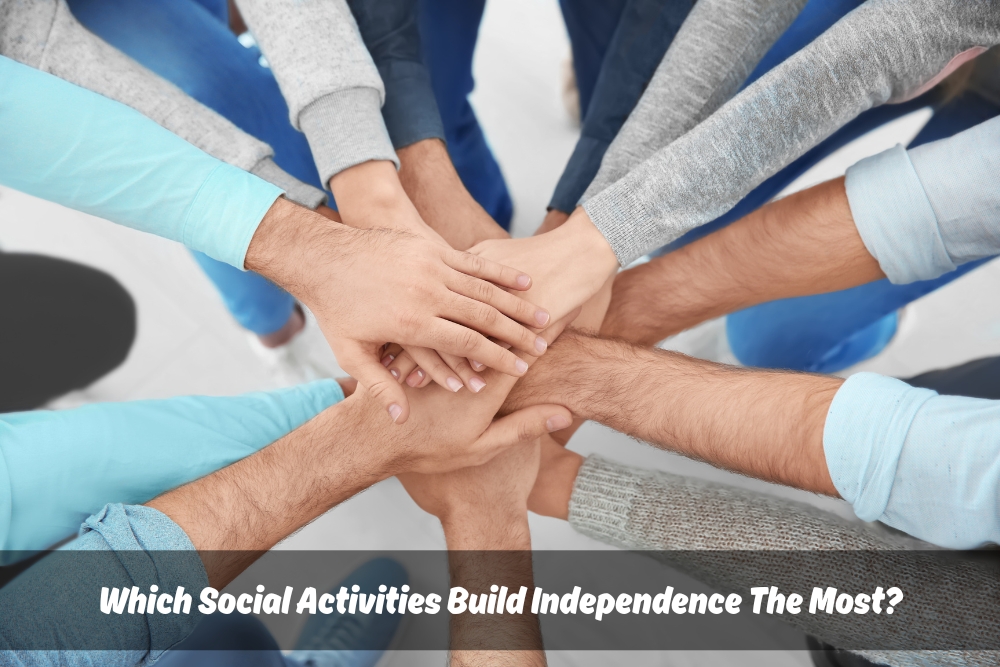Social activities are the vital elements of human interaction, they help create a sense of belonging and shared experiences. But do you know that some social activities can be used as a mighty weapon for developing independence? This guide will explore how social engagement can enable you to stand on your feet with your head held high.
What social activities foster independence?
Social activities come in all kinds and forms, from having a coffee with your friend to joining the local sports club. The main thing is to look for activities that will make you go beyond your comfort zone in order to improve your skills and make decisions on your own.
There is a natural link between social interactions and independence. Through interacting with others, you will learn to manage different personalities, be assertive and gain confidence. This way of thinking helps them to overcome difficulties and make their own decisions.
Why is independence important?
Personal independence is the key to self-development. It builds a spirit of being self-reliant, thus equipping you with the ability to overcome the challenges of life with greater resilience. Autonomy allows you to have the opportunity to take control of your life, choose what you like, and in the end, live a more fulfilling life.
Freedom also affects your total well-being. It decreases the sense of uselessness and loneliness, making your self-esteem more positive and increasing your ability to control your life.
How does social interaction contribute to independence?
Social interaction acts as a training ground for independence. By interacting with others, you learn to communicate effectively, advocate for yourself, and navigate social situations. You also develop problem-solving skills as you work through group dynamics and challenges.

Here are some key aspects of social activities that promote independence:
- Shared responsibility: While working as a team in activities such as volunteering and group fitness classes you learn to contribute and to depend on others. This balance of independence and interdependence becomes healthy.
- Exposure to diverse perspectives: Social interaction opens your mind and makes you familiar with people who think differently. This will assist you in discovering your own unique perspective and ability to make wise choices.
- Building a support network: Having strong social ties can be a safety net. It enables you to be courageous and take calculated risks while being adventurous with the knowledge that there is support in case you need it.
Which specific social activities enhance independence?
Here are some specific social activities that can give your independence a boost:
- Volunteering: It is not only a way to acquire new skills, but also to connect with people who share the same values and help your community to grow. The purpose and achievements of volunteering can be a great way to build up the self-reliance and confidence you may have lost.
- Joining a club or group: In a team or group that is dedicated to a common interest, you will be exposed to new challenges that will allow you to learn from others and create a sense of belonging. Consequently, you are pushed to do things you have never tried before and to be more independent.
- Taking a class or workshop: Sometimes it is the learning of a new skill, either pottery, coding or public speaking, which boosts your self-confidence and problem-solving skills. Such skills you have developed can be the driving force to achieve your goal of doing things on your own in other life areas.

Remember, the effectiveness of social activity for building independence depends on your specific goals and comfort level. Stepping outside your comfort zone is crucial. It’s important to choose activities that spark your interest and allow for gradual growth.
When should you engage in social activities to maximise independence?
The timing and frequency of your social engagement depend on your personal needs and goals. However, here are some tips to maximise the independence-building benefits:
- Start small and gradually increase your involvement. Don’t overwhelm yourself by jumping into a demanding activity straight away.
- Seek opportunities for leadership and initiative. Look for opportunities within social activities that allow you to take charge and make decisions.
- Focus on quality over quantity. Choose social activities that are genuinely engaging and allow you to learn and grow.
Creating space for independent reflection after social interactions is also important. Take some time to process your experiences, and identify your strengths and weaknesses. In addition, consider how you can apply your learnings to become more independent in other areas of life.
Where can you find social activities to cultivate independence?
Finding social activities to cultivate independence is easier than you think! Here are some resources:
- Community centres: Lots of community centres have different classes, workshops, and clubs which meet the needs of many.
- Online platforms: The internet is full of sites. You can link up with local groups if you are into a specific hobby or interest.
- Volunteer organisations: Volunteering portals are the places where you can quickly find out about the openings that suit your interests.
Don’t hesitate to try something unusual and unexpected! Contact your friends, coworkers, or a librarian at your local library for suggestions. Keep in mind that the best social pursuits are the ones that invite you to embark on a journey of evolution and self-exploration.
What are the long-term benefits of engaging in social activities for independence?
Engaging in social activities specifically chosen to build independence has lasting effects that go far beyond the initial experience. Here’s how:

- Transferable skills: Social skills such as self-confidence, communication skills and problem-solving abilities gained in social activities become valuable assets for life. You will see yourself tackling your work or relationship problems with brand-new self-confidence and the capability to rely on yourself.
- Resilience: Social activities that challenge and stretch you beyond your comfort zone make you more resilient. You learn the art of adjusting to new situations, overcoming disappointments, and trusting your capabilities to face uncertainties on your own.
- Lifelong learning: The exposure to various points of view and life experiences obtained through social activities produces the love to learn throughout life. This curiosity to learn new things and the willingness to adapt in the face of the uncertain future makes independence possible, even as life throws unexpected curveballs.
- Stronger social network: Getting out of your comfort zone so as to interact with others may end up leading to the creation of strong and supportive social networks. These bonds give people belonging and a support network, knowing that there are people you can count on in times of need, and at the same time you are not dependent on them.
Conclusion
Social activities are often seen as purely recreational, but their impact on building independence is undeniable. By choosing the right social engagements, you can develop valuable skills, boost your confidence, and cultivate a sense of self-reliance that translates into all aspects of life. So, step outside your comfort zone, explore new social opportunities, and watch your independence flourish!
At Auburn Health, we understand the importance of fostering a healthy and independent lifestyle. We offer a variety of programs and resources to help you connect with your community, develop new skills, and build confidence. Visit our website or contact us today to learn more about how Auburn Health can support you on your journey towards greater independence.


